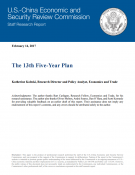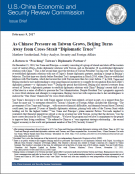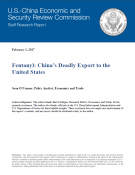Research
Research

High-speed rail is a symbol of China’s technological progress and a significant source of national pride. In under a decade, China built the world’s largest high-speed rail network and developed globally competitive rail companies. Now Beijing is pursuing contracts for high-speed rail projects abroad. This staff report examines China’s high-speed rail diplomacy and growing footprint in the U.S. rail market. China’s initial forays in the U.S. rail market suggest Chinese rail firms have a mixed impact on U.S. industry. The United States does not have a domestic high-speed rail manufacturing industry, but China’s entry into the U.S. rail market could undermine competition by pitting heavily subsidized, state-owned companies against private firms.
Research

China is an important market for U.S. firms, but policies outlined in the 13th Five-Year Plan seek to create new Chinese competitors that will be able to challenge U.S. companies abroad while slowly closing market opportunities in China for U.S. and other foreign firms in important high-tech sectors such as biopharmaceuticals, robotics, and aviation. This staff report analyzes the 13th Five-Year Plan, the Chinese government’s most important strategy to address its economic, social, and environmental challenges over the next five years, focusing on key national targets (including subsequently announced localization and innovation targets), market access commitments, and its implications for the U.S. employment, innovation, and economic growth.
Research

In December 2016, Sao Tome and Principe—a country consisting of a group of islands and islets off the western coast of central Africa—broke diplomatic relations with Taiwan, and re-established diplomatic relations with China. The issue brief describes what happened, what it means for Taiwan, and how it fits into a series of measures that Beijing has taken to pressure Taiwan since the election of Taiwan’s President Tsai Ing-wen.
•This is the second time since President Tsai’s election that Beijing has re-established diplomatic relations with one of Taipei’s former diplomatic partners—of which it now has only 21—marking a change in Beijing’s behavior. In 2008, Taipei and Beijing reached a tacit understanding to stop competing for recognition from each other’s diplomatic partners—a “diplomatic truce.” During the period that followed, Beijing also rejected overtures from several of Taiwan’s diplomatic partners to establish diplomatic relations with China.
•Taiwan’s diplomatic relationships are significant for symbolic and practical reasons. Although, Taiwan almost certainly gains more from its unofficial relations with countries that have extensive international influence, such as the United States, diplomatic relations are an important component of Taiwan’s toolbox for maintaining a presence on the international stage.
•Despite President Tsai’s pragmatic approach to cross-Strait relations and attempts to compromise, Beijing views her with suspicion due to her unwillingness to endorse the “one China” framework for cross-Strait relations. Other measures that Beijing has taken to pressure Taipei since President Tsai’s election include suspending official and semiofficial cross-Strait communication and meetings and excluding Taiwan from meetings of international organizations, among others.
Research

Mass quantities of fentanyl, a low-cost and highly potent synthetic drug, are being produced in China and brought illegally to the United States, contributing to a growing U.S. opioid crisis. The rise of fentanyl in the United States can be traced back to China’s large chemical and pharmaceutical industries, which manufacture vast quantities of the drug and its analogues to export to the western hemisphere with little regulatory oversight. This report examines how China’s illicit chemical production and inefficient U.S. and international counternarcotic efforts have contributed to dramatic increases in fentanyl-related deaths in the United States.
